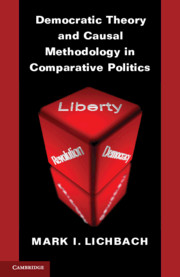Book contents
- Frontmatter
- Contents
- List of Tables
- Preface
- 1 Methodology’s Problem, and Democracy’s Too
- Part I Rationalism and Constructivism
- Part II State-Society and Contentious Politics
- 5 Pragmatic Theories of a Fit State: Kohli
- 6 Pragmatic Theories of a Fit Democracy: Tilly
- Part III Conclusions: Three Chapters, Five Themes, and Twelve Theses
- References
- Index
6 - Pragmatic Theories of a Fit Democracy: Tilly
Published online by Cambridge University Press: 05 May 2013
- Frontmatter
- Contents
- List of Tables
- Preface
- 1 Methodology’s Problem, and Democracy’s Too
- Part I Rationalism and Constructivism
- Part II State-Society and Contentious Politics
- 5 Pragmatic Theories of a Fit State: Kohli
- 6 Pragmatic Theories of a Fit Democracy: Tilly
- Part III Conclusions: Three Chapters, Five Themes, and Twelve Theses
- References
- Index
Summary
To navigate between a thin democracy determined exogenously and a thick democracy fashioning its own future, a free and rational society requires a fit state. After presenting Tilly’s contentious democracy (Section 6.1), this chapter discusses his causal claims (Section 6.2). It then explores his causal methodology: complex contingent dynamic processes (Section 6.3). Since it is able to deal with environmental challenges, Tilly’s contentious democracy is also a fit democracy (Section 6.4).
CONTENTIOUS DEMOCRACY
Suppose that there is no common currency of politics and no scheme to rank all social values. Further suppose that there is no single Good Life simultaneously manifesting the best of all moral goods and no one doctrine of Practical Reason on which all interests converge. Finally, suppose that there is no unitary Big Answer that makes all of the above consistent with one another. With no overarching principle to arbitrate or resolve conflicts, values inevitably come into conflict with one another. Rawls (1993: 129) thus writes that rather than being contingent, “reasonable pluralism is a permanent condition of public culture under free institutions.” Even if a citizen is neither misinformed nor stupid, neither irrational nor obstinate, neither evil nor wicked, but rather is knowledgeable and smart, sincere and well-intentioned, and rational and cooperative, his or her own values could conflict. Among a set of citizens, values do not necessarily converge. Many distinct, well-reasoned, and intelligent positions can exist.
- Type
- Chapter
- Information
- Publisher: Cambridge University PressPrint publication year: 2013



